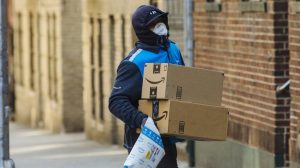(ThyBlackMan.com) Being neither a scientist nor a physician, I can only rely on my common sense as to why communities of color have been hardest hit by the coronavirus pandemic. And no, I don’t think it’s because Kunta Kinte was forced to change his name to Toby, or the prevalence of underlying health conditions caused by poor lifestyle choices. To me, the most straightforward reason is because many of the jobs people in these communities do are “public facing”, increasing the risk of exposure to the virus.
People working in the retail and food service industries have been at about the same risk of contracting COVID-19 as healthcare workers; and have had less access to personal protective equipment. Workers in Walmart stores, Amazon warehouses and Kroger’s supermarkets, for example, have all been highly susceptible to getting sick, and dying, from the virus. It’s estimated that ten thousand workers in meatpacking plants, and their family members, have been infected.
Disposable people
These are workers who John Logan, labor historian at San Francisco State University, says are in “essential jobs done by disposable people.” Low wage workers have been dying in these places and more than half of them don’t have paid sick leave, let alone healthcare benefits. In fact, many of these workers’ wages are so low they still have to rely on government programs like food stamps and Medicaid to feed their families and provide for their medical care.
And that’s for those who still have jobs. The Federal Reserve reported that in March, nearly 40% of workers earning less than $40,000 per year were unemployed. In addition, while 63% of college graduates had jobs where they said they could work from home, the same held true for only 20% of workers with a high school diploma or less.
In the midst of all this, the current administration is pressing ahead with its litigation to abolish the Affordable Care Act and legislation to shield employers from liability if their employees get sick on the job; even though the Occupational Safety and Health Administration has promulgated no COVID-related regulations for employers to follow to ensure a safe workplace.
This failure of leadership has the country on course to see over 100,000 deaths from COVID-19 by June according to the Centers for Disease Control. Many of whom will have died needlessly if only they had had the PPE they needed, or paid time off so they could have stayed home when they felt ill and not infected their co-workers. Unacceptable for what is supposed to be the “greatest country in the world.”
The post-COVID world
Many prominent thinkers are already trying to envision what life will be like in the post-COVID world. Changes that will be made in how we work, play, learn and shop. We have already seen many low wage jobs being replaced by automation and predictions are that trend will accelerate.
But for the “essential” low wage jobs that remain for the foreseeable future, we should support efforts by these workers to unionize so they can bargain collectively for the wages and benefits they deserve, to do the jobs we need to keep our economy running. The $15.00 minimum wage alone is not enough.
The Walton family, owners of Walmart, are some of the richest people in the United States and Jeff Bezos, owner of Amazon, is the richest man in the world. Workers for these companies, and others like them, should not have to rely on public welfare programs to make ends meet.
Sharon Block of the Labor and Worklife Program at Harvard Law School said, coronavirus “made workplace conditions of low wage workers relevant to the whole country.” We label their jobs “essential” and call them “heroes.” Let’s do whatever we can to make sure they’re treated like it.
Staff Writer; Harry Sewell

















Leave a Reply